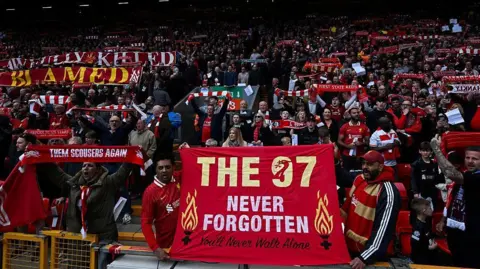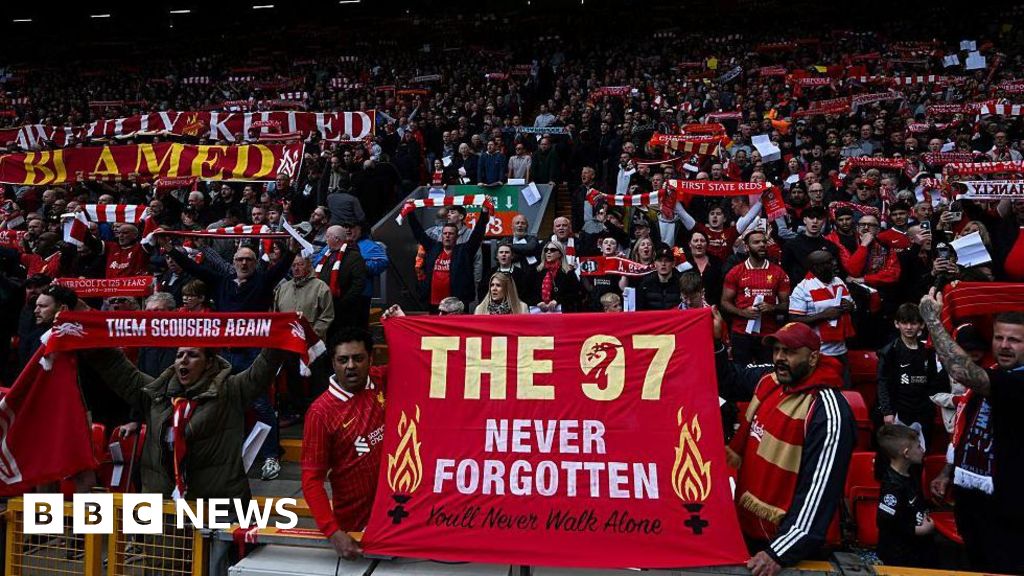Judith MoritzSpecial correspondent
 Getty Images
Getty ImagesNinety-seven people died because of the Hillsborough disaster. Hundreds more were injured. And there are many still living with psychological damage wrought by the stadium crush.
While this suffering springs from the day of the disaster – 15 April 1989 – it’s been compounded by the prolonged struggle for justice since then.
Following the news that an agreement has been reached on the long-awaited introduction of the Public Office (Accountability) Bill on Tuesday – commonly referred to as Hillsborough Law – here’s a reminder of how we got here.
Inquests and trials
It took 27 years before a court finally ruled that those who died were unlawfully killed, and that the fans who were caught up in the crush bore no responsibility for causing it.
Those were amongst the findings of the second set of Hillsborough inquests, which finished in 2016.
The verdicts were marked with singing outside the coroner’s court, as bereaved families and survivors celebrated a hard-fought moment.
They weren’t to know that it would be nearly another decade before they had cause to celebrate again.
In the aftermath of the inquests, there was high expectation. Campaigners felt that the 2012 Hillsborough Independent Panel, and the resultant two-year-long inquests, had at last given them the truth about what happened.
But there had been no accountability. No justice.
Criminal trials would follow, but with little to show for them. The only person to be convicted was a Sheffield Wednesday club official who was fined £6,500 for a health and safety offence.
The senior police officer in charge at Hillsborough, David Duckenfield, was acquitted of gross negligence manslaughter after two trials.
A third trial, of two officers and a solicitor accused of amending police statements, collapsed.
A police misconduct investigation, run by the Independent Office for Police Conduct, has been running since 2012 – and is yet to publish its final report.
Meanwhile, some survivors and families who made complaints about individual officers have recently been receiving letters notifying them of the outcomes. Plenty have waited all this time, only to find that their complaints have not been upheld.
Campaigners died fighting for justice
Many of those I speak to in the Hillsborough community have been feeling despondent. They’ve come to see that moment of celebration after the inquests as their high-water mark.
To some it even feels as though things have gone backwards, with fears that the false blame narrative will take hold once more.
And the years continue to pass – it’s 36 since the disaster. Some of those bereaved by Hillsborough have now themselves passed away. Prominent campaigners like Anne Williams, Phil Hammond, Rose Robinson and Barry Devonside are no longer here to speak out.
But amongst those left, there is still determination. A will to ensure that a positive legacy can be wrought from the wreckage of Hillsborough.
The creation of a Hillsborough Law will go a long way to help with that.
What is the law?
Like everything else, its genesis has been a struggle. Its first seeds were sown nearly a decade ago, in April 2016, after the inquest verdicts. Despite sharing in that triumph, barrister Pete Weatherby KC, who represented 22 families, was less positive than most at that point.
For him, the inquests had exposed two particular injustices which remained unresolved.
Firstly, there had been no legal obligation for the public authorities involved to co-operate with the process fully or transparently. Information could be withheld. A culture of reputational defensiveness was able to take root, and false narratives were re-run.
The inquests, originally listed for six months, had ended up lasting for two years – in part because they became so adversarial. Pete believed that a legal “duty of candour” was needed, so that civil servants could face consequences if they put toeing the party-line above telling the truth at inquiries. A “duty to assist” was required too – to force officials to proactively supply information to inquiries.
Otherwise, he reasoned, there was nothing to prevent other state failings being denied and covered up, like Hillsborough had been.
Secondly, there was the issue of a real imbalance when it came to funding legal representation. For years, the Hillsborough families had had to scrimp, save, and fundraise to pay for lawyers. Their costs at the inquests – which would eventually run to more than £63m – were only bearable because they were met by the Home Office which set up a special scheme to cover them. The families’ lawyers were paid the same rate as those representing the police and other state bodies.
But there was no guarantee that the government would repeat this arrangement for others. The authorities would always have access to expensive lawyers, while victims of different scandals and disasters stood to be outgunned in court without equal funding.
Pete felt that parity of funding should also be enshrined in legislation. The barrister, who was used to arguing points of law in court, now sat down to write the first rough draft of a proposed new law.
His efforts were soon bolstered by the other lawyers who’d represented the various Hillsborough families. Together they created the Public Authority (Accountability) Bill, which captured the two key principles of full candour and equal funding.
The unwieldy title soon became shorthanded as Hillsborough Law. It had the backing of the families and survivors. There was plenty of political support too and in March 2017 it was presented to Parliament with cross party sponsorship, including that of then MP Andy Burnham.
What has caused its delay?
But the Bill’s progress was halted when the 2017 General Election was called, and it fell. Subsequent governments have chosen not to reintroduce it.
The years since then have been hard going for the Hillsborough Law Now campaign. Its architects wanted the law to be put in place to help victims of other disasters involving the state.
Instead they watched as a raft of tragedies occurred, including the 2017 Grenfell Tower fire in west London, the Manchester Arena attack (also 2017), and the Post Office, Infected Blood and Nuclear Test Veteran scandals – all the while, no progress was made on their bill.
Indeed, many of the justice campaigns for those disasters have joined the Hillsborough Law Now group, finding common cause and mutual strength.
What happens now?
Finally, last year, when Labour came back into power, the Hillsborough Law was reborn. It was announced in the King’s Speech, and the government pledged to introduce it by the time the next anniversary of the disaster arrived on 15 April 2025.
But that date came and went, and nothing happened.
In July 2025, Liverpool MP Ian Byrne tried to re-introduce the original 2017 version of the bill to the House of Commons for a second reading – but he was blocked. The government was determined to draft its own version of the law, rather than adopt the former bill wholesale.
I understand that for the last year, behind the scenes there has been a lot of negotiation between government ministers and civil servants on one side, and Hillsborough Law campaigners on the other. I believe that there was substantial opposition to enacting such legislation from various sources.
Ministers may well have been ready to introduce a version of the Bill before now, but without all the key provisions that campaigners hold vital.
The prospect of the government introducing a Hillsborough Law without the backing of the majority of the disaster’s families and their supporters would have been farcical.
But the forthcoming Labour Party conference – happening in Liverpool later this month – may well have focused minds. The announcement that the agreement has finally been reached will prevent a hostile reception from some in the city.
It’s worth saying that not all of those bereaved by Hillsborough are equally supportive of the law. But many have been vocal in backing it and, having felt despondent about the lack of success on other fronts, say they now have something positive to point to.
It’s not game over, though. The Bill will still have to make progress through Parliament. Its detail will be debated. There’s concern that there is still political will from some quarters – both inside and outside government – to undermine it as it travels through the legislative process.
Campaigners tell me that there is still room for improvement in the drafting of the Bill. They say they intend to remain “hyper-vigilant” during this process, holding the government to account, to ensure the law is passed in full. They say it has to be practical and effective – not just a law in name alone, but one that has real impact.
Only then will they feel that Hillsborough has left a legacy which they can stand by, and which will help prevent others experiencing a similar tortuous journey.
